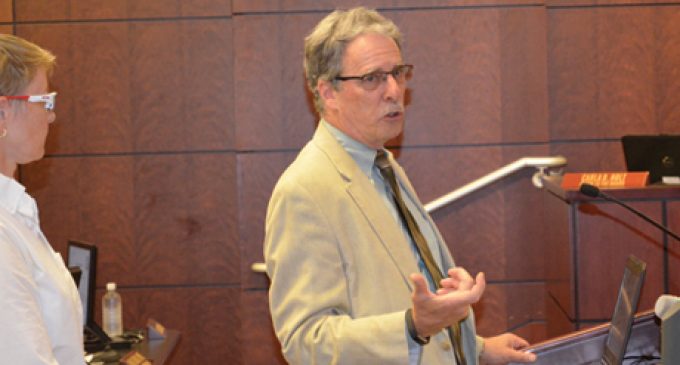Judge Fine asks county for drug court funding

District Court Judge Lawrence Fine and defense attorney Kerri Sigler appealed to the Forsyth county commissioners for $35,000 to restart adult drug court during a briefing on Thursday, Aug. 24.
The previous adult drug court in the county was funded by the state for 15 years and ended in 2011, when its funding was cut. Fine, who presided over that court, told commissioners that drug court deals with a variety of illegal drugs, but could be especially helpful in the current opioid crisis.
“We don’t have programs at this time that are able to sufficiently address the needs that these folks have,” he said.
Fine explained the court is a sentencing alternative for those with drug charges. It’s a treatment program that requires participants to come to court every other week and follow treatment recommendations. It’s based on positive reinforcement with incentives like bus and restaurant passes for those who do well. Relapses will result in sanctions, like writing a letter of apology or confessing what they did to others. Nationally, 75 percent of people who participated in a drug court remained arrest-free for two years. Fine said the last local drug court had a 40 percent success rate.
“I think it’s the best thing that the court system can offer to folks who have addiction problems,” said Fine.
Sigler, a former public defender, said she began the process of trying to restart the drug court by contacting those who had been involved in it and starting a non-profit, Phoenix Rising, to raise money for the effort. So far it’s raised $20,000. The City of Winston-Salem has set aside $35,000 in this fiscal year’s budget for the court, contingent on those funds being matched.
She said $55,000 is needed for a court coordinator position, who keeps track of which participants are complying with the court.
“It’s a vital position, we cannot operate drug court without,” she said.
The coordinator is the only paid position specifically for the court, as the judge, probation officers and others there will be fulfilling court duties they’re normally paid for and Sigler will be donating her services as a defense attorney. She said the court will have up to 25 participants in treatment.
The court will also use $10,000 for specialized drug testing that can tell the difference between opioids and the drugs that are being taken to treat opioid addiction. The tests cost approximately $3.75 each and participants will be tested twice per week.
The rest of the court’s budget goes to incentives, filling in treatment coverage gaps for participants and awareness campaigns to prevent drug abuse.















